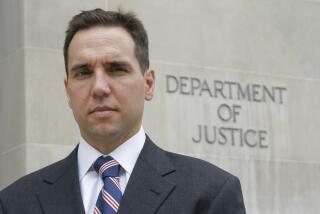Special counsel to investigate whether Toyota hid evidence in rollover case
- Share via
A Texas judge has named a special counsel to investigate whether Toyota Motor Corp. intentionally hid evidence during a 2006 lawsuit involving a woman paralyzed when her Camry rolled over.
Johnson County District Court Judge John E. Neill appointed J. Gregory Coontz to the job, giving him power to probe whether Toyota violated a court order in the case, which was settled in 2007 for $1.5 million.
The judge took the unusual step after reviewing internal documents provided by a former Toyota lawyer who managed rollover litigation for the company and subsequently claimed that the automaker intentionally held back safety data in lawsuits.
Those allegations were cited by the victim in the Camry crash, Pennie Green, in a motion filed in the Texas court in late 2009 to hold Toyota in contempt of court for its handling of her lawsuit. She argues that Toyota hid information from her during discovery, and that otherwise she might have sought a bigger settlement or gone to trial.
If her charges prove true it could be a significant blow to Toyota, which has been working to bolster its credibility in the wake of federal investigations into its sudden acceleration problems. In addition, a contempt ruling against Toyota could be cited by attorneys representing motorists in scores of lawsuits against the automaker nationwide.
“We are confident that we have acted appropriately with respect to product liability litigation and our discovery practices, including in the Green case,” Toyota said in a statement. “The recent order by the Texas court is not a finding that Toyota violated any discovery obligation.”
Jeff Embry, Green’s attorney, said that he might move to reopen the case if the court does determine that Toyota acted in contempt.
“Our position is we want to get to the truth and we believe the judge does too,” Embry said. “There must be enough information in the documents the judge reviewed for him to proceed with the case.”
Embry said he had not seen those documents, some 6,000 pages of which were handed over by Dimitrios Biller, who worked at Toyota from 2003 to 2007 and subsequently was embroiled in litigation with the automaker. Because the documents contain privileged company information they have been kept under seal by Neill.
In a lawsuit, Biller claimed that Toyota settled with Green to prevent her from gaining access to company records known as “Books of Knowledge,” containing potentially damaging safety data about vehicles including the 1997 Camry, the model that Green drove.
Toyota has disputed that account. But last August, the Texas Supreme Court rejected a plea by the automaker that the contempt motion be dismissed, handing it back to Neill.
Last month an arbitrator in California threw out Biller’s suit, ruling that he had breached his severance agreement and awarding Toyota $2.6 million in costs and damages.
In an interview Friday, Biller said he expects to be questioned by the special counsel. He and Embry both noted that the arbitrator, in his ruling, did not determine whether Toyota had committed discovery fraud, focusing solely on Biller’s adherence to his severance terms.
In a Feb. 3 letter announcing the appointment of the special counsel, Neill indicated that he intended to answer that question, giving Coontz wide-ranging powers to determine whether Toyota acted in contempt and to “remedy the alleged violation of this order, if any.”
Coontz, a personal injury and business litigation attorney in Burleson, Texas, could not be reached. He co-founded a firm in 1990 with Neill, then a private attorney. In 1998, Neill was appointed to the bench by Gov. George W. Bush.
More to Read
Inside the business of entertainment
The Wide Shot brings you news, analysis and insights on everything from streaming wars to production — and what it all means for the future.
You may occasionally receive promotional content from the Los Angeles Times.










